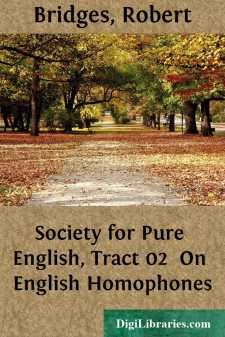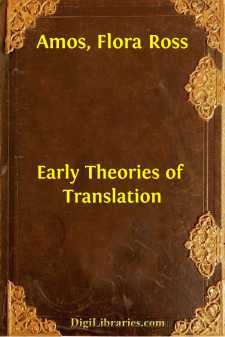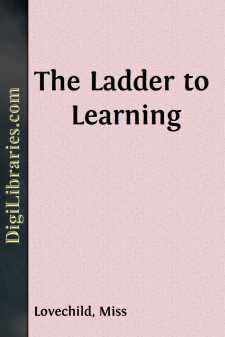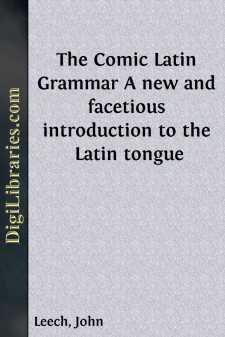Language Arts & Disciplines
Language Arts & Disciplines Books
Sort by:
by:
Robert Bridges
ENGLISH HOMOPHONES Definition of homophone. When two or more words different in origin and signification are pronounced alike, whether they are alike or not in their spelling, they are said to be homophonous, or homophones of each other. Such words if spoken without context are of ambiguous signification. Homophone is strictly a relative term, but it is convenient to use it absolutely, and to call any...
more...
by:
Flora Ross Amos
PREFACE In the following pages I have attempted to trace certain developments in the theory of translation as it has been formulated by English writers. I have confined myself, of necessity, to such opinions as have been put into words, and avoided making use of deductions from practice other than a few obvious and generally accepted conclusions. The procedure involves, of course, the omission of some...
more...
by:
Henry Bradley
INTRODUCTION. The work now for the first time reprinted from Caxton’s original edition has been preserved in three copies. One of these is in the Library of Ripon Cathedral, another in the Spencer Library, now at Manchester, and the third at Bamborough Castle. A small fragment, consisting of pp. 17-18 and 27-28, is in the Bodleian Library. The text of the present edition is taken from the Ripon copy....
more...
by:
Miss Lovechild
THE LADDER TO LEARNING BY MISS LOVECHILD. MARKS' EDITION. 1852 AlbanyPublished by R. H. Pease516 Broadway a A stands for Ape, for Arthur, and Air. b B stands for Bullock, for Bird, and for Bear. c C stands for Cat, for Charles, and for cry. d D stands for Dog, for Daniel, and Dry. e E stands for Eagle, for Edward, and Eel. f F stands for Fish, for Francis, and Feel. g G stands for Goat, for Great,...
more...
by:
John Leech
The Author of this little work cannot allow a second edition of it to go forth to the world, unaccompanied by a few words of apology, he being desirous of imitating, in every respect, the example of distinguished writers. He begs that so much as the consciousness of being answerable for a great deal of nonsense, usually prompts a man to say, in the hope of disarming criticism, may be considered to have...
more...
INTRODUCTION Punctuation is a device by which we aid words to tell their story. Words have done this at times without such aid, and may now do so, but at constant risk of serious misunderstanding. This can be easily seen by reading the following lines printed as they would have been written in an ancient manuscript....
more...
LECTURE I. GENERAL VIEW OF LANGUAGE. Study of Language long considered difficult. — Its importance. — Errors in teaching. — Not understood by Teachers. — Attachment to old systems. — Improvement preferable. — The subject important. — Its advantages. — Principles laid down. — Orthography. — Etymology. — Syntax. — Prosody. Ladies and Gentlemen, It is proposed to commence, this...
more...
by:
Edmund Luce
The aim of the present book is to help boys to translate at sight. Of the many books of unseen translation in general use few exhibit continuity of plan as regards the subject-matter, or give any help beyond a short heading. The average boy, unequal to the task before him, is forced to draw largely upon his own invention, and the master, in correcting written unseens, has seldom leisure to do more than...
more...
by:
William Richards
RHAGYMADRODD. Mae yr awyddfryd cynyddol sydd yn mhlith y Cymry i ymgydnabod yn fwy â’r iaith Saesoneg yn un o arwyddion gobeithiol yr amserau. Am bob un o’n cydgenedl ag oedd yn deall Saesoneg yn nechreuad y ganrif hon, mae yn debyg na fethem wrth ddyweud fod ugeiniau os nad canoedd yn ei deall yn awr. O’r ochor arall, y mae rhifedi mwy nag a feddylid o’r Saeson sy’n ymweled a’n gwlad...
more...
by:
Duchess
The Duchess "The story of my first novel" My first novel! Alas! for that first story of mine—the raven I sent out of my ark and never see again! Unlike the proverbial curse, it did not come home to roost, it stayed where I had sent it. The only thing I ever heard of it again was a polite letter from the editor in whose office it lay, telling me I could have it back if I enclosed stamps for...
more...











